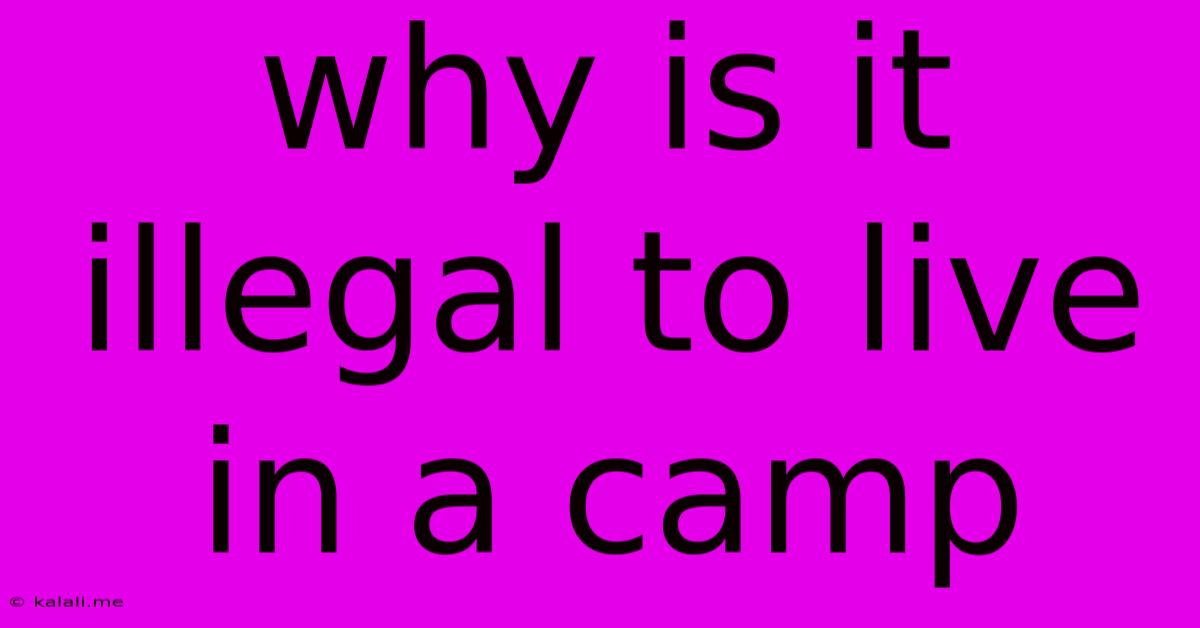Why Is It Illegal To Live In A Camp
Kalali
Jun 04, 2025 · 3 min read

Table of Contents
Why Is It Illegal to Live in a Camp? The Complexities of Unpermitted Settlements
Living in a camp, often conjuring images of tents and makeshift shelters, might seem like a simple way to find affordable housing or a connection to nature. However, the legality of such living arrangements is far from straightforward, and in most developed nations, it's generally illegal. This illegality stems from a confluence of factors, impacting public health, safety, environmental protection, and land ownership rights. This article will delve into the reasons behind the illegality of unauthorized camping and living in camps.
The Core Issues Behind the Prohibition:
Several interconnected reasons contribute to the illegality of living in unauthorized camps:
1. Public Health and Safety Concerns:
- Sanitation: Camps often lack proper sanitation facilities, leading to the spread of diseases and contamination of water sources. This poses a significant risk not only to the residents but also to the wider community. Waste management, including sewage disposal, becomes a major issue in densely populated camps.
- Fire Hazards: Improperly constructed shelters and cooking methods create a heightened risk of fires, especially in dry or wooded areas. This poses a severe threat to both the campers' lives and the surrounding environment.
- Crime and Security: Unauthorized camps can become breeding grounds for criminal activity, offering anonymity and hindering law enforcement efforts. Lack of security measures also increases the vulnerability of residents to violence and theft.
- Access to Emergency Services: Reaching emergency services in remote or poorly accessible camps can be difficult and time-consuming, potentially delaying critical medical assistance.
2. Environmental Regulations and Land Ownership:
- Environmental Impact: Unauthorized camping often leads to environmental damage, including deforestation, soil erosion, and pollution of water bodies. The lack of waste management contributes significantly to environmental degradation.
- Land Ownership Rights: The land on which unauthorized camps are established usually belongs to someone else – whether a private landowner, the government, or a conservation organization. Living on someone else's property without permission constitutes trespassing and infringes on their property rights.
- Zoning and Land Use Regulations: Most areas have zoning regulations that dictate how land can be used. Establishing a permanent or semi-permanent settlement in an area not zoned for residential purposes is a violation of these regulations.
3. Lack of Infrastructure and Services:
- Access to Water and Electricity: Unauthorized camps typically lack access to essential utilities such as clean water and electricity, forcing residents to rely on potentially unsafe sources.
- Limited Access to Healthcare and Education: Residents of unauthorized camps often face significant barriers to accessing healthcare, education, and other essential social services.
- Poor Road Access and Transportation: Lack of proper roads and transportation infrastructure can further isolate camp residents and complicate access to essential services.
Exceptions and Nuances:
It's crucial to acknowledge that the legality of camping is not always black and white. There might be exceptions, such as:
- Designated Camping Areas: Many areas have designated campsites with proper facilities and permits, making camping legal and safe.
- Temporary Shelters during Emergencies: In the aftermath of natural disasters or emergencies, temporary shelters might be established to provide immediate housing for displaced individuals. These are usually managed and regulated by authorities.
- Indigenous Rights: In certain contexts, indigenous communities might have traditional rights to occupy and utilize specific lands, even if it involves living in camps.
Conclusion:
While the romantic image of living in a camp might be appealing, the reality often involves significant legal and practical challenges. The illegality of unauthorized camps primarily stems from concerns related to public health, safety, environmental protection, and respect for property rights. Understanding these complexities is vital to finding sustainable and safe housing solutions for all. Addressing the underlying causes of homelessness and lack of affordable housing is crucial to tackling the issue of unauthorized settlements and ensuring that everyone has access to safe and secure shelter.
Latest Posts
Latest Posts
-
How To Convert Act 365 To Act 360
Jun 06, 2025
-
Movies That Depict Virtual Reality As Bad
Jun 06, 2025
-
Can You Take A Laptop On A Plane
Jun 06, 2025
-
Can A Fusion Reactor Explode Mekanism
Jun 06, 2025
-
How To Get Paint Off Wood Molding
Jun 06, 2025
Related Post
Thank you for visiting our website which covers about Why Is It Illegal To Live In A Camp . We hope the information provided has been useful to you. Feel free to contact us if you have any questions or need further assistance. See you next time and don't miss to bookmark.